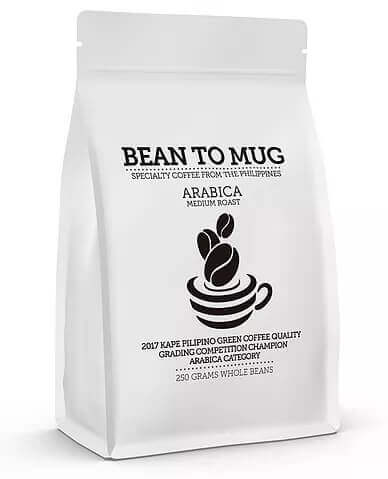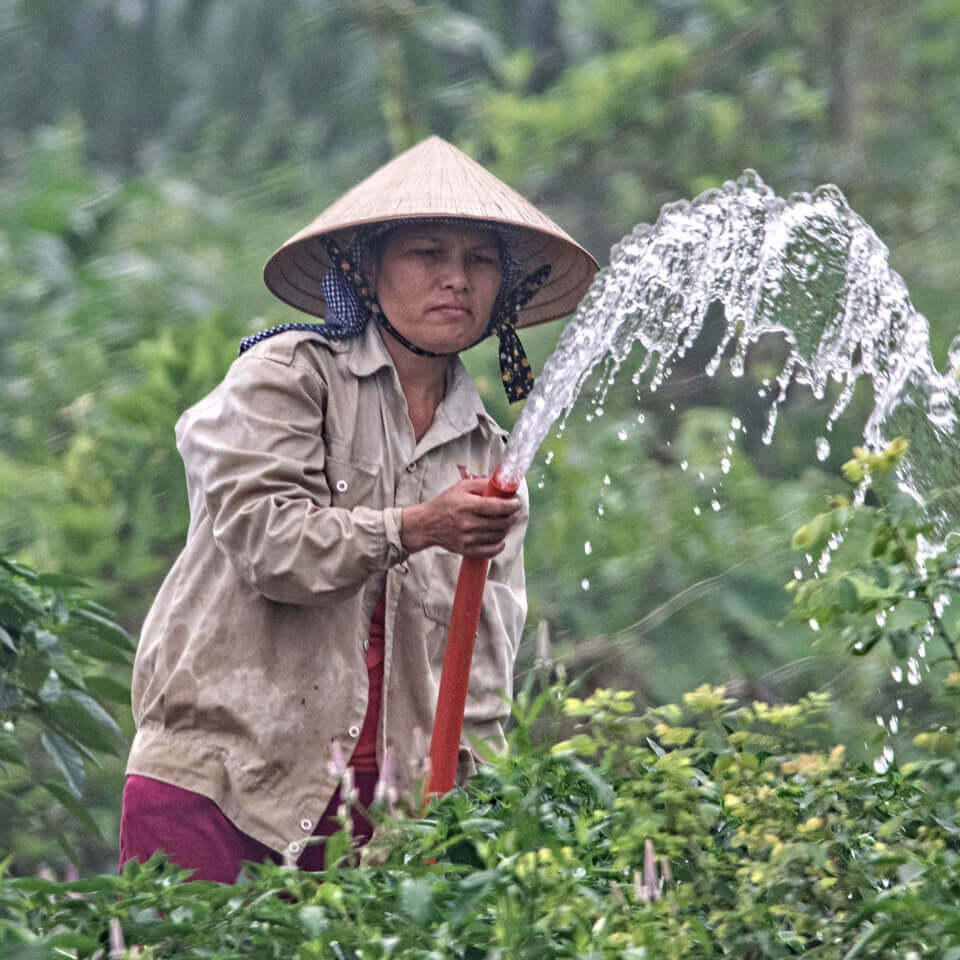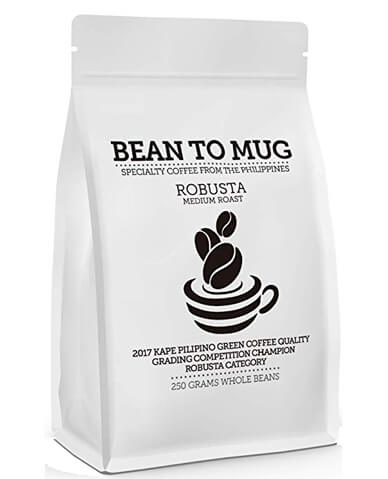
Start your day strong doing what you love the most with Bean to Mug Organic Coffee.
Robusta Coffee
Kape Maramag is a small coffee farm located at the foot of the Kalatugan Mountain Range. You can find it 1125 – 1200 ft in the sky in Maramag, Bukidnon in the Southern Philippines.
Organic Whole Bean Robusta
Looking for a delicious morning brew to perk you up in the morning? Savor the taste and the kick of the finest Organic Coffee Robusta from the Mountains of the Southern Philippines. Robusta is hardy, low acid organic coffee. Strong with a great finish, this full-bodied coffee can be the sparkplug to start your busy day at home or the office.
Why Robusta is For You
Robusta, a species of Coffea Canephora, comes from Central and Sub-Saharan Africa
Robusta is hardy, able to withstand harsher environments and still produce strong yields even at lower altitudes
High-quality Robusta has higher caffeine concentration, with more than double of Arabica
Apart from caffeine, every cup has more antioxidants, together with some other health benefits
Because the coffee beans are hardier, they need zero chemicals and pesticides to grow
Robusta has a full-bodied mouthfeel, with an earthy flavor, floral and dark chocolate notes
2017 Kape Pilipino Green Coffee Quality Grading Competition Champion, Robusta Category – Coffee Quality Institute(CQI), R Graded At 83.42. R Grade Score at the 2018 Philippine Coffee Quality Competition with a Grade of 84.46
Get Your Organic Coffee Robusta Straight Out of the Philippine Mountains through Amazon! This is our Robusta the best coffee you can find.
The Perfect Mug
Espresso shots? Regular brew? Our Robusta coffee beans are here to wake you up. This coffee is for the busy go-getter in you.
All Women-Farmed Coffee
Our Robusta is organic coffee sourced from the Rural Improvement Club (RIC) Maramag, an exclusive women-only circle. Each coffee bean goes under the careful hands of Filipino women coffee farmers. All-natural – no adverse chemicals, no pesticides.
Exotic Bean
Each of our Robusta whole beans come from between 1,200 m in height. All of them grow under fertile mountain lands, with the best local climate for top-shelf organic whole bean coffee.

Careful Processing
French Press or Drip
Ethically Single-Origin
Our Robusta whole beans are all single-origin from the same producers. We let the local women farmers in the Philippines dictate their price. Every packet is organic fair trade for a conscientious sip.
Our Avid Coffee Drinkers
Best coffee i have tried plus it’s organic..❤️
Stephannie Tan
The best coffee I ever had!
Christine Valenzona Dulin
Hands down for being the best coffee. What are you waiting for? Have a cup now! ❤️
Claire Anne
Explore Our Culture

We are proud and honored to promote the work of these strong, independent women. They make it possible for you to enjoy a delicious sip of low acid organic coffee. They’re not just the reflection of the Philippine coffee culture where women can stand up for themselves. They are shining examples of sustainable development and ethical harvesting.
So… Which Coffee do you Love Most?

Frequently Asked Questions
What are coffee beans?
Coffee beans are the seeds of the coffee “cherry”; two seeds normally grow within each cherry. On the tree, the beans are covered by the silverskin (a vestigial remainder of the fruit’s development, also called the spermoderm). The silverskin is covered by a parchment skin (the endocarp), which is covered by a slimy layer (the parenchyma), surrounded by a thin layer of pulp (the mesocarp), all covered by an outer skin (the exocarp). These layers must be removed prior to roasting, though some silverskin often remains attached.
How important is the beans' country of origin?
The coffee’s country of origin is largely a matter of subjective taste, and you will benefit by sampling a wide variety of origins and roasting styles. Origin is important in that the comparative bean flavor between growing regions, even within the same country, can be quite different. As a result, it is difficult to make sweeping generalizations about the coffees in any particular region.
Arabica and Robusta
All coffee beans come from plants in the genus Coffea. Although there are thousands of species of plants within this genus, with tremendous variance in size and shape, only two are of commercial importance: Coffea arabica, and Coffea canephora, the latter more commonly called robusta, after a prime variety. A third species, Coffea liberica has found some localized production in Liberia, but it is of minor significance in the global market.
What's the difference between dry processing and wet processing?
Dry processing is the oldest method of processing coffee. The cherries are washed and then spread out on drying racks to dry in the sun for several weeks, or alternatively, are dried by machine. During this drying process, the pulp ferments, lending a particular taste to the bean. How the coffee is handled during drying—whether sun-dried coffee is protected against adverse weather or temperature, the machine driers’ temperature, etc.—effects the eventual quality and flavor of the bean. After the beans are dried, they are machine processed to remove the dried outer layers.
Wet processed beans have their outer skins removed by machine processing, then the fruit with the exposed pulp is allowed to ferment in tanks where bacteria and naturally occurring enzymes consume the pulp. The beans are then washed and dried, also either by sun or machine, and the dried beans are then milled to remove the remaining layers.

